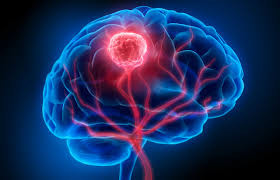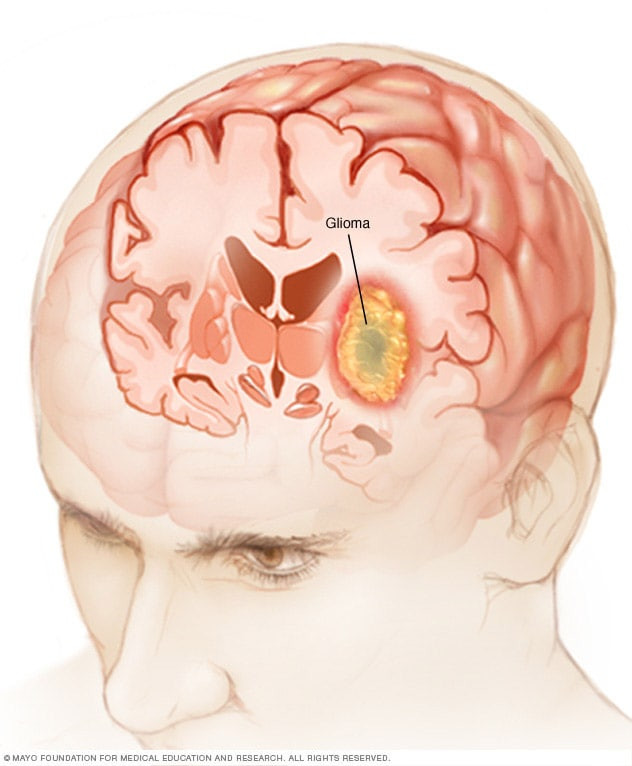Definisi
Tumor otak merupakan pertumbuhan jaringan atau massa yang tidak normal pada otak yang berasal dari jaringan otak. Terdapat berbagai jenis tumor otak. Beberapa jenis tumor otak bersifat jinak (benigna) dan beberapa lainnya bersifat ganas (maligna, kanker). Tumor otak dapat berasal dari otak (primer) dan merupakan penyebaran dari tumor di organ lain (metastasis). Fokus dari artikel ini akan membahas mengenai tumor otak primer.
Tumor otak dialami oleh ~3.7 per 100,000 laki-laki dan 2.6 per 100,000 perempuan di dunia. Angka ini lebih tinggi pada negara berkembang (5.8 untuk laki-laki dan 4.1 untuk perempuan) dan lebih rendah di negara maju. Di Indonesia, Data Riset Kesehatan Dasar (Riskesdas) 2013 tidak mencantumkan jumlah insiden tumor otak di Indonesia. Data dari RSUPN Cipto Mangunkusumo tahun 2011–2015 menunjukkan rata-rata usia pasien tumor otak primer adalah 48 tahun dan lebih banyak dialami oleh perempuan. Jenis tumor otak yang paling sering dialami adalah astrositoma (47%). Data di RS Kanker Dharmais tahun 1993–2012 menunjukkan insidensi tumor otak adalah 1% dari seluruh keganasan.
Penyebab
Tumor otak primer berasal dari jaringan otak atau jaringan di sekitar otak, seperti meninges (selaput yang melapisi otak dan sumsum tulang), saraf kranial, kelenjar pituitari, dan kelenjar pineal. Pertumbuhan tumor otak primer dimulai ketika terjadi perubahan pada sel normal akibat mutasi pada DNA. Mutasi pada DNA ini menyebabkan pertumbuhan dan pembelahan sel yang tidak normal sehingga jaringan tersebut terus tumbuh. Selain terus tumbuh, jaringan ini juga terus hidup dan tidak bisa mati. Hasil dari proses ini adalah kumpulan sel yang tidak normal yang disebut tumor. Pada orang dewasa, tumor otak lebih jarang terjadi dibandingkan tumor hasil penyebaran dari tumor di organ lain (metastasis).
Beberapa jenis dari tumor otak berdasarkan tipe selnya, antara lain:
- Glioma, merupakan tumor yang berasal dari otak atau sumsum tulang belakang yang terdiri atas astrositoma, ependymoma, glioblastoma, oligoastrositoma, dan oligodendroglioma.
- Meningioma, merupakan tumor yang berasal dari selaput meninges, yaitu lapisan yang menyelubungi otak dan sumsum tulang. Umumnya meningioma bersifat jinak.
- Neuroma akustik (schwannoma), merupakan tumor jinak yang berasal dari saraf kranial VIII, yang berfungsi untuk mengontrol keseimbangan dan pendengaran.
- Medulloblastoma, tumor pada otak yang paling sering terjadi pada anak, berasal dari bagian bawah otak dan menyebar melalui cairan serebrospinal.
- Adenoma pituitari, merupakan tumor yang berasal dari kelenjar pituitari. Kelenjar ini berada pada dasar otak dan berperan untuk mengatur hormon.
Faktor Risiko
Faktor yang dapat meningkatkan risiko mengalami tumor otak primer, antara lain:
- Paparan radiasi. Orang yang lebih sering terpapar radiasi memiliki risiko yang lebih tinggi untuk mengalami tumor otak. Contoh dari radiasi yang dimaksud adalah radioterapi untuk mengobati kanker atau paparan radiasi dari bom atom.
- Riwayat keluarga dengan tumor otak. Sebagian kecil dari tumor otak diturunkan dan dipengaruhi oleh genetik.
Gejala
Tanda dan gejala dari tumor otak akan dipengaruhi oleh lokasi, ukuran, dan tahap perkembangan tumor tersebut. Gejala yang umumnya dialami antara lain:
- Perubahan awitan atau pola nyeri kepala
- Nyeri kepala yang semakin berat dan semakin sering
- Mual dan muntah
- Gangguan penglihatan, seperti penglihatan buram, penglihatan ganda (double vision), dan tidak dapat melihat bagian sisi-sisi (loss of peripheral vision)
- Penurunan sensasi dan gerakan pada tangan secara progresif
- Kejang tiba-tiba tanpa riwayat epilepsi
- Gangguan pendengaran
- Gangguan keseimbangan
- Gangguan bicara
- Disorientasi, merasa kebingungan
- Sulit untuk mengambil keputusan
- Sulit untuk melakukan rutinitas dan instruksi sederhana
- Perubahan sikap dan perilaku
Diagnosis
Jika dokter mencurigai Anda mengalami tumor otak, terdapat beberapa pemeriksaan yang akan dilakukan, antara lain:
- Pemeriksaan Neurologis, antara lain pemeriksaan penglihatan, pendengaran, keseimbangan, koordinasi, kekuatan otot, dan refleks. Pemeriksaan ini dapat membantu dokter untuk memperkirakan ada/tidaknya tumor dan lokasi tumor.
- Pemeriksaan Radiologi, seperti MRI kepala dapat membantu menegakkan diagnosis tumor otak. Umumnya teknik yang digunakan adalah MRI kontras, yaitu dengan penyuntikan kontras melalui pembuluh darah Anda.
- Biopsi jaringan. Biopsi dapat dilakukan sebagai bagian dari prosedur operasi untuk mengangkat tumor otak. Sampel jaringan akan dilihat melalui mikroskop untuk dievaluasi jenis dan ganas/jinak-nya.
Tata Laksana
Pilihan pengobatan untuk tumor otak bergantung pada lokasi, ukuran dan jenis tumor tersebut. Dokter dapat menggunakan kombinasi terapi untuk mengatasi tumor otak. Pilihan terapi tersebut antara lain:
- Operasi. Jika memungkinkan, dokter bedah saraf Anda akan melakukan operasi pengangkatan tumor.
- Radioterapi (terapi radiasi). Paparan radiasi dengan dosis tinggi dapat membantu menghancurkan atau membunuh sel tumor. Beberapa pasien akan mendapatkan terapi radioterapi terlebih dahulu untuk mengecilkan ukuran tumor sebelum diangkat melalui operasi.
- Kemoterapi. Kemoterapi menggunakan obat-obatan untuk membunuh sel. Kemoterapi dapat dikonsumsi secara oral (dalam bentuk pil) atau infus (intravena).
- Terapi target. Terapi target adalah modalitas pengobatan yang menargetkan kelainan pada sel kanker. Dengan menghambat proses yang tidak normal ini diharapkan sel kanker dapat berhenti tumbuh.
- Rehabilitasi pasca pengobatan. Karena tumor otak dapat menyebabkan gangguan pada kemampuan motorik, bicara, penglihatan, dan kognitif, rehabilitasi perlu dilakukan untuk mengembalikan fungsi tersebut. Dokter Anda dapat merujuk Anda ke rehabilitasi medik, terapi okupasi, dan terapi bicara sesuai dengan kebutuhan Anda.
Komplikasi
Tumor otak primer jarang menyebar ke organ lain. Komplikasi yang dapat terjadi akibat tumor otak primer, antara lain adalah penurunan berat badan, nyeri tulang (pada punggung, iga, dan tengkorak), pembengkakan perut, kesulitan bernapas, dan bentuk kepala yang tidak normal. Komplikasi ini dapat semakin memburuk dan mengancam jiwa. Tumor otak dapat mengalami perdarahan dan menyebabkan peradangan pada otak, sehingga meningkatkan tekanan di dalam kepala. Hal ini merupakan kondisi gawat darurat yang perlu mendapatkan penanganan segera. Pada kondisi lain, herniasi otak juga dapat terjadi. Herniasi otak merupakan kondisi di mana sebagian dari otak mengalami penekanan akibat tingginya tekanan di dalam kepala. Tanda dari herniasi otak antara lain adalah perubahan pada pola pernafasan dan penurunan kesadaran.
Terapi dari tumor batang otak juga dapat menyebabkan efek samping, seperti anemia, masalah pencernaan, perubahan pada kulit dan kuku, rasa lelah berkepanjangan, rambut rontok, peningkatan risiko perdarahan, imunitas rendah, dan mual muntah.
Komplikasi lain dari tumor otak adalah meningeal carcinomatosis, yaitu persebaran tumor otak ke lapisan meninges di sekitarnya. Hal ini dapat menyebabkan gejala berupa demam, kaku leher, kejang, dan/atau penurunan kesadaran.
Pencegahan
Kejadian tumor otak tidak dapat dicegah, namun Anda dapat mengurangi risiko mengalami tumor otak dengan menghindari paparan radiasi dan zat toksik, seperti merokok. Deteksi dini terhadap gejala yang dialami juga dapat membantu penanganan lebih cepat sehingga dapat mencegah terjadinya komplikasi.
Kapan Harus Ke Dokter?
Jika Anda mengalami gejala di atas yang dirasakan sangat mengganggu, gejala memberat akhir-akhir ini, dan memiliki riwayat keluarga dengan tumor otak, segera periksakan diri Anda ke fasilitas kesehatan terdekat. Gejala yang perlu diperhatikan antara lain:
- Muntah terus menerus
- Nyeri kepala yang hebat dan semakin berat
- Kesulitan untuk bernafas
- Kelemahan pada lengan atau tungkai, perubahan sensasi, dan gangguan bicara
- Tidak sadarkan diri
- Kejang yang baru atau kejang yang bertambah parah
Mau tahu informasi seputar penyakit lainnya? Cek di sini, ya!
- dr Nadia Opmalina
Mayo Clinic Staff. (2021). Brain tumor. MayoClinic. Available from: https://www.mayoclinic.org/diseases-conditions/brain-tumor/diagnosis-treatment/drc-20350088
Sung H, Ferlay J, Siegel RL, Laversanne M, Soerjomataram I, Jemal A, Bray F. Global Cancer Statistics 2020: GLOBOCAN Estimates of Incidence and Mortality Worldwide for 36 Cancers in 185 Countries. CA Cancer J Clin. 2021 May;71(3):209-249. doi: 10.3322/caac.21660. Epub 2021 Feb 4. PMID: 33538338.
*Aninditha T, Wiratman W. (2017). Buku Ajar Neurologi. Departemen Neurologi Fakultas Kedokteran Universitas Indonesia.
Ham S. (2017). Brain Tumor. Healthline. Available from: https://www.healthline.com/health/brain-tumor
Cleveland Clinic Staff. (2020). Brain tumor. Clevelandclinic. Available from: https://my.clevelandclinic.org/health/diseases/6149-brain-cancer-brain-tumor












